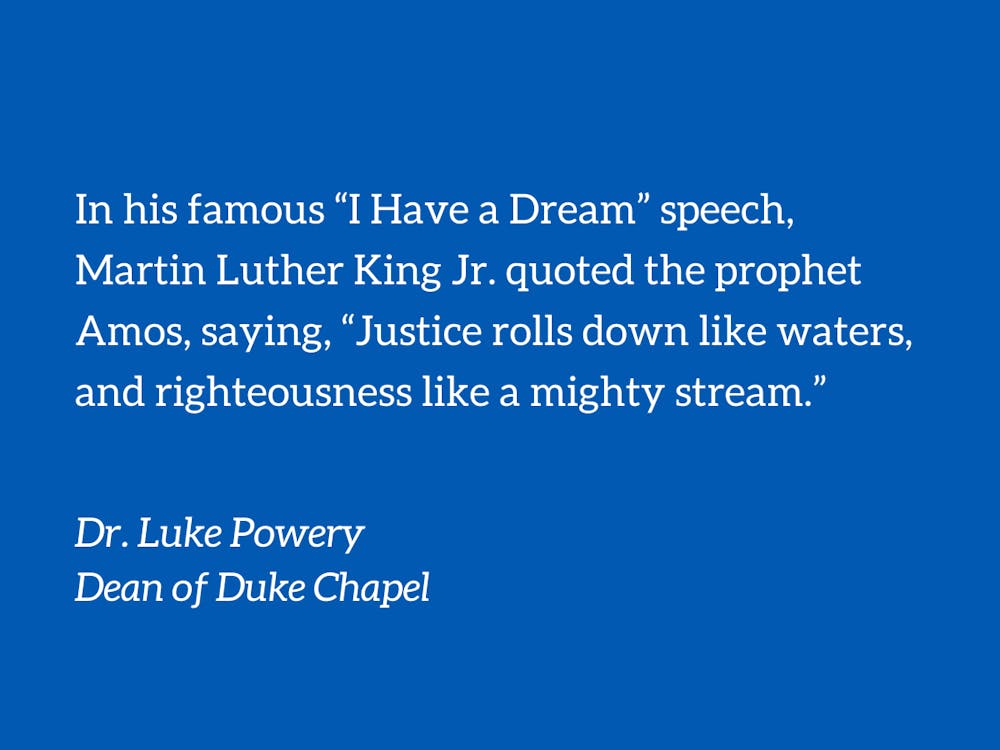In his famous “I Have a Dream” speech, Martin Luther King Jr. quoted the prophet Amos, saying, “Justice rolls down like waters, and righteousness like a mighty stream.” King returned to these words repeatedly in his speeches and sermons; they were a kind of theological and linguistic motif for his ministry. As we once again consider King’s legacy, it is helpful to examine the larger literary context of this oft-quoted scripture verse from chapter five of the Book of Amos, in which the prophet is relaying a divine message that no ceremony or song can make up for injustice in a community.
The first thing to know about this scripture passage is that it is not light bedtime reading. It is a serious message just like King’s. In his judgment oracle, Amos is cautioning leaders in an unjust society who want God to come and take charge of things. We learn from Amos that this coming “day of the Lord” might not be what these leaders expect because it is “darkness, not light; as if someone fled from a lion, and was met by a bear; or went into the house and rested a hand against the wall, and was bitten by a snake.”
Amos goes on to explain why God would be so severe with them. To these leaders who “trample on the poor” and “push aside the needy in the gate,” Amos has this message about their hypocrisy: “I hate, I despise your festivals, and I take no delight in your solemn assemblies. Even though you offer me your burnt offerings and grain offerings, I will not accept them; and the offerings of well-being of your fatted animals I will not look upon. Take away from me the noise of your songs; I will not listen to the melody of your harps.” The key elements of their worship — the festivals, the sacrifices and the melodic praise — disgust God. This is a shocking word, and in particular to religious people, because it reveals that the people of God can become enemies of God.
This reminds me of what Dr. King once said in his sermon "The Three Dimensions of a Complete Life": There are people who may profess God with their lips but “deny God’s existence with their lives.” Like Amos, he is pointing to a potential danger of piety, spiritual practice or liturgical rites. Sometimes, the very practices established to draw one close to God create a distance from God. Rites don’t make one righteous but rather can be ruinous.
Finally, for Amos, righteousness and justice are both related to the social order, and especially to the protection of the weak and poor. How a people lives as a community of God in the world should be linked to their worship of God. And so, Amos’ condemnation of unacceptable religious rituals is immediately followed by those famous words: “Let justice roll down like waters, and righteousness like an ever-flowing stream.” King embraced this message of Amos and worked on behalf of the poor and the oppressed.
The wisdom of Amos — especially for religious practitioners — offers a challenge to integrate one’s lip service and life service. We can sing folk songs all we want, but in the end, are we helping the folk? Are we working toward justice and righteousness in the marketplace of life — in homeless shelters and food pantries and court rooms and prisons and addiction recovery centers? On this MLK day, this is what should roll down and flow like streams from our lives.
The Rev. Dr. Luke A. Powery is Dean of Duke University Chapel. His column runs on alternate Mondays.
Get The Chronicle straight to your inbox
Sign up for our weekly newsletter. Cancel at any time.

